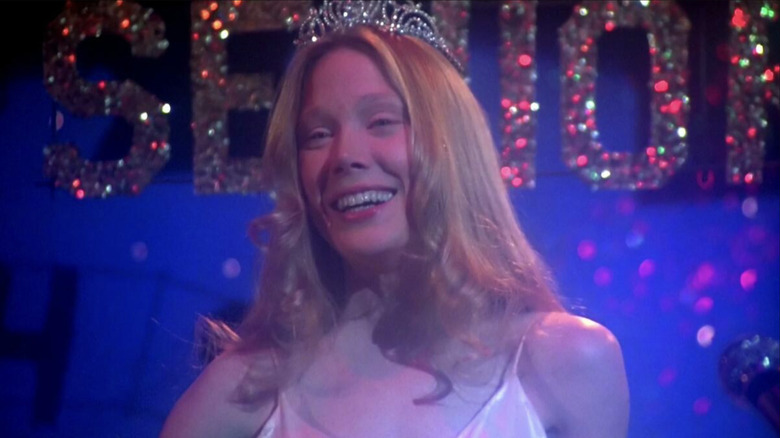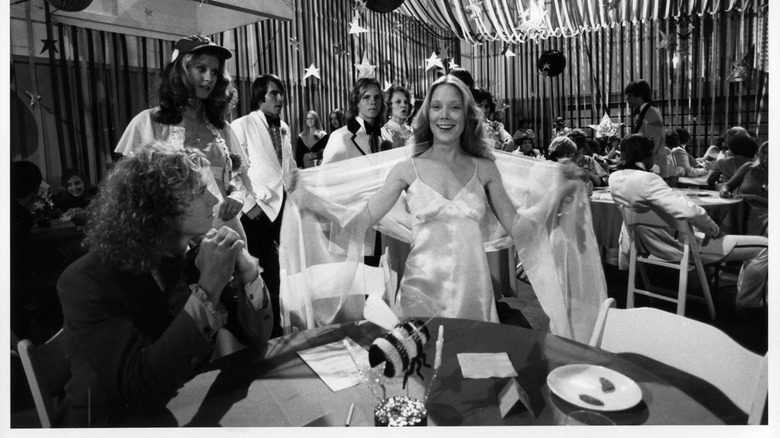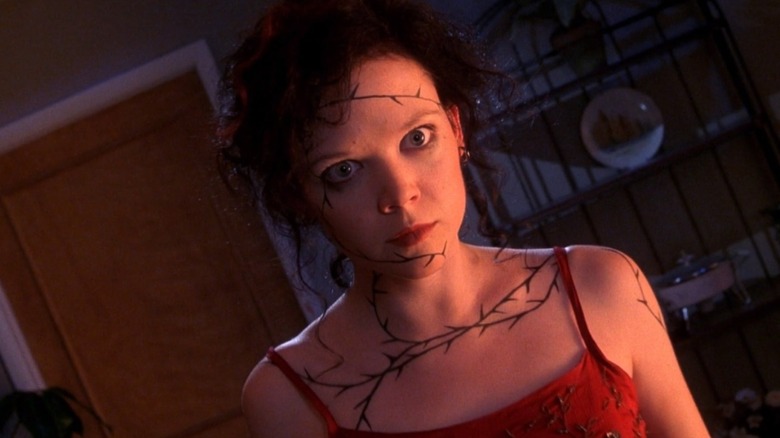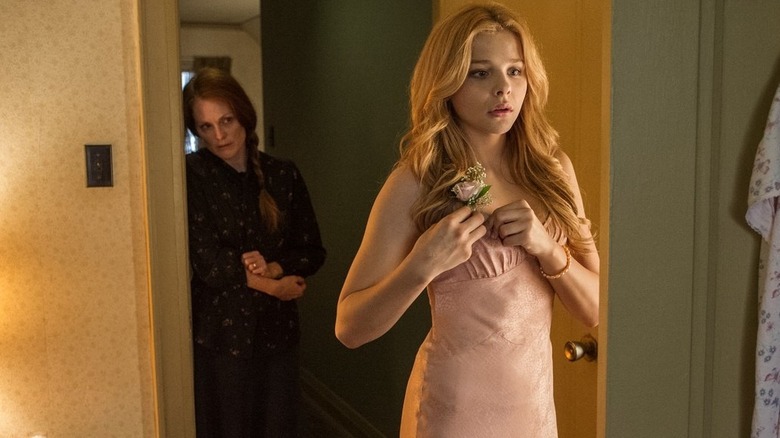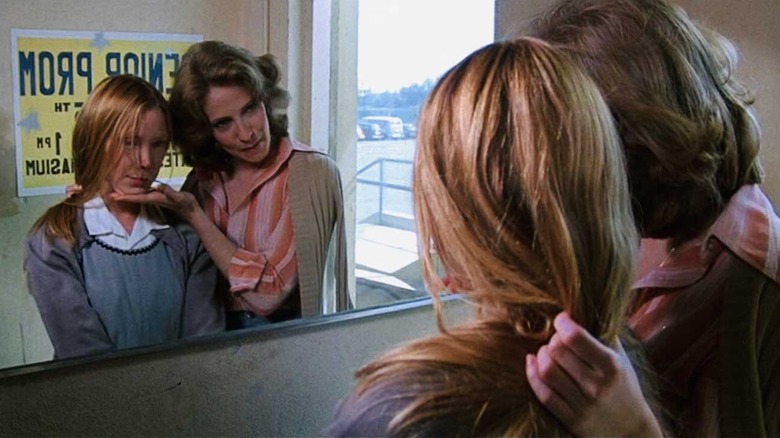One Classic Stephen King Character Has Never Been Adapted Properly
It's hard to be down in the dumps when the start of the work week brings the news that horror maestro and Stephen King aficionado Mike Flanagan has been tapped to adapt the King's monumental first novel, "Carrie," as a TV series. Flanagan has consistently knocked it out of the park with his adaptations of King's work, like turning the seemingly unadaptable "Gerald's Game" into one of the best King movies ever made and doing the impossible with "Doctor Sleep" by bridging King's novel with the imagery of Stanley Kubrick's take on "The Shining." As of publication, Flanagan is set to release "The Life of Chuck" in 2025 after a successful premiere out of the Toronto International Film Festival, and is working to crack the script for his take on "The Dark Tower." Flanagan is a magician when it comes to picking and choosing which aspects of King's books to treat like gospel and which areas have a little bit of wiggle room, which gives me high hopes that Flanagan will finally be the person to adapt Carrie White's story of telekinetic terror and tragedy the way King originally envisioned her. But all of the major adaptations have failed to include a vital part of her story.
We are long overdue for a fat Carrie White.
Now, before someone gets all up in my mentions online about how a fat Carrie White would be some "forced diversity" or whatever nonsensical buzzword was added to the dictionary of Annoying Commenters to parrot during their last update, Carrie White is canonically fat per King's text. She's a "frog among swans" with pimples, blonde hair, pale skin, and she's overweight. Make no mistake: I think all of the previous Carries (Sissy Spacek, Angela Bettis, Chloë Grace Moretz, Emily Bergl in "The Rage: Carrie 2," and even Madelaine Petsch in the "Riverdale" special) all bring something special and unique to the character, and Spacek's turn is so iconic that she set the standard for the public's vision of Carrie White that all adaptations have been trying to meet.
But something is lost about Carrie's story when she's not permitted to be a fat girl.
Pig's blood on prom night
The prom scene in "Carrie" is one of the most well-known moments in horror history, so much so that even people who've never seen the film can take one look at a blood-soaked prom queen and know that they're looking at Carrie White, covered in pig's blood. The cruel prank from bully Chris Hargensen and her boyfriend Billy Nolan was a way to humiliate Carrie on multiple levels all at once.
Most obviously, Carrie famously has her first menstrual period at school and doesn't know what it is and has a freakout, inspiring her classmates to hurl pads and tampons at her while screaming, "Plug it up!" Chris's cruelty towards her and subsequent disobedience during detention is what earns her the refusal of her prom tickets. This is her version of payback, blaming Carrie instead of accepting the consequences of her own actions.
On a smaller level, it's also a way to punish Carrie for her overbearing and religious mother, as Margaret White's fire and brimstone beliefs have made her a staunch follower of terrifying Old Testament rules, which also include the claim that the Lord has prohibited the eating of pork and all unclean meat. Covering Carrie in the blood of an unclean animal would no doubt spark an emotional spiral out of Margaret and bring further harm to Carrie.
But above all else, it's a way for Chris to punish Carrie for being fat. She didn't choose chicken's blood to indicate she's a coward or even lamb's blood to play into her innocence ... she chose pig's blood because she thinks Carrie is a fat pig and wanted to add insult to injury. Chris Hargensen is, in my opinion, the horror genre's ultimate Mean Girl because her master plan to publicly disgrace the poor Carrie White isn't some petty prank — it's borderline emotional terrorism. The pig's blood is and will always be effective regardless of Carrie's size, but there's an extra gut punch to the situation if she is fat. "Pig blood for a pig."
Who is afforded a Good For Her moment?
Carrie White is the godmother of the "Good For Her" subgenre of horror movies, where the audience roots for a female protagonist to figuratively (or sometimes literally) burn it all down before the film's end. After Chris's "prank" at the prom, Carrie kicks her telekinetic powers into overdrive and massacres her classmates. It's a horrific and harrowing sight, but one that the audience welcomes because they've watched all these lil' pricks bully her directly or indirectly for an entire movie. Screw these jabronis! Give 'em hell, Carrie! But an audience effortlessly empathizing with an actress who fits conventional size standards is easy in a fatphobic society. Thin privilege is knowing that if you're bullied by your classmates, people are more likely to be on your side and rightfully view you as the victim compared to fat people who are often told they "deserve it" or that the bullying will "help them" stop being fat.
"They're all going to laugh at you" hits harder when you already exist in a body that laughs at you the second you step out in public. As King wrote, "The low bird is not picked tenderly out of the dust by its fellows; rather, it is dispatched quickly and without mercy."
When we first see Carrie White in the locker room before the start of her period, adaptations often showcase the room like an ethereal Eden as heavenly, waifish bodies are displayed on the screen. Would the audience react the same way if a fat girl was shown in the shower, or would they immediately be repulsed by her figure? Roger Ebert famously said that movies are machines that generate empathy, and compelling the audience to be on the side of a fat girl who is bullied so mercilessly she kills everyone would force people to have empathy for the plight of a person that society overwhelmingly views as lesser-than. Fat women are seldom given the chance to exist on screen at all, let alone in roles where they get to be the hero.
Carrie's fatness does matter
"Carrie" adaptations (save for productions of the musical) have never allowed Carrie to be fat, because deep down, I think filmmakers know that general audiences will reject the idea of having to root for a fat girl. Part of why Chris' stunt is so visually effective is because it's the bastardization of the ultimate prom night fantasy. Carrie's night looks like something out of a fairy tale, only to be corrupted by the blood. As the poet Rachel Wiley correctly and painfully once said, "My college theater professor once told me that despite my talent, I would never be cast as a romantic lead. We put on shows that involve flying children and singing animals, but apparently, no one has enough willing suspension of disbelief to buy anyone loving a fat girl."
The "Carrie" adaptations have all even acknowledged the cruel politics of a looks-based social economy in high school. Mrs. Collins stands with Carrie in the mirror in Brian De Palma's 1976 classic and tells her "Now that's a pretty girl" as a way to comfort her after Tommy Ross asks her to the prom. And she's not lying to her, because Sissy Spacek is a gorgeous woman. In the 2002 TV remake, Tommy Ross jokes to Sue Snell, "We should have a rule: If they do something in a Freddie Prinze Jr. movie, we're not allowed to do it in real life," after she asks him to take Carrie to the prom. Meaning — he's fully aware that Angela Bettis' Carrie White will clean up nicely without much effort and they're practically acting out a teen movie cliche.
Later on, Miss Desjardin (the same character as Miss Collins but with the book's accurate name) even tells Carrie that she'll have her revenge at her 10-year reunion when all of the popular girls and bullies are fat. Being fat is seen as such a moral failure and something worth making fun of that it's used to make Carrie feel better about her social status. And while I do have a soft spot for Chloë Grace Moretz's Carrie White because she truly does wish to fit in and high schoolers will absolutely bully you for being poor or religious no matter how beautiful you are, Moretz is the furthest thing from a "frog among swans."
It's time to tell Carrie's story properly
Carrie White is one of the most important characters in the horror canon, and I've been championing the idea of a fat Carrie for years. Fatness does not make a person a lost cause, worthy of ridicule, or "ugly," but as a fat woman myself, I'm not delusional enough to pretend like the rest of the world agrees with me. If I had a dollar for every time someone told me I was "pretty for a fat girl," would be "perfect if I just lost the weight," or had some sort of body-specific insult thrown at me by someone who disagreed with something I said, I could retire. The world is downright hostile to fat people just existing, which is why Carrie's story is so important to tell as it was originally envisioned by Stephen King. Thinness in women is the default in film and TV, meaning fatness is almost exclusively presented as a plot point, character trait, or shorthand for the audience to indicate a character's place in the film's hierarchy of power.
The entertainment industry is laughably bad at best and offensively callous at worst when it comes to depicting fat people on screen, but I trust that if Mike Flanagan were to give Carrie White the space to be fat, he could do her justice. Hollywood might be afraid of a fat Carrie, but that's exactly why she should finally get the chance to tell her story, which is the story of so many of us.
Carrie White is the fat girl who had an unrequited crush on a cute classmate who wouldn't dare look her way because of her size. Carrie White is the girl who had to learn to sew because buying a prom dress at the store wasn't a possibility for someone her size. Carrie White is the girl bullied simply for existing in a body outside of what society deems appropriate. Carrie White is the justified rage so many of us feel inside, but aren't ever able to express.
It's time for a Carrie White who stares down her classmates, blood pooling in the folds of her flesh as her tormenters look on in horror as they realize the only thing soft about this girl is the curvature of her face and frame.
